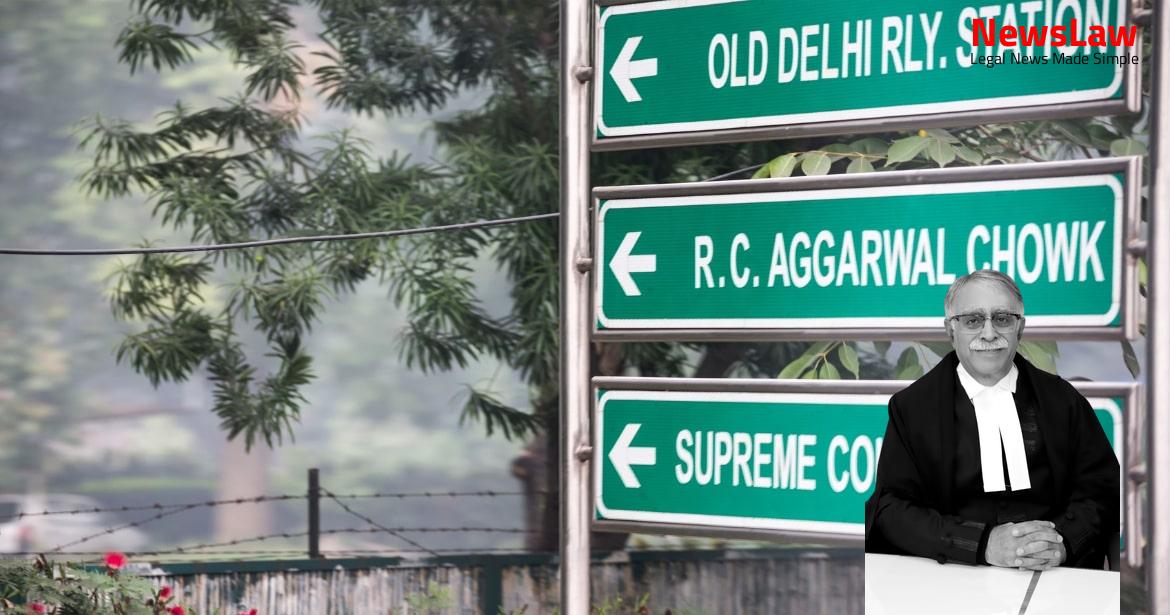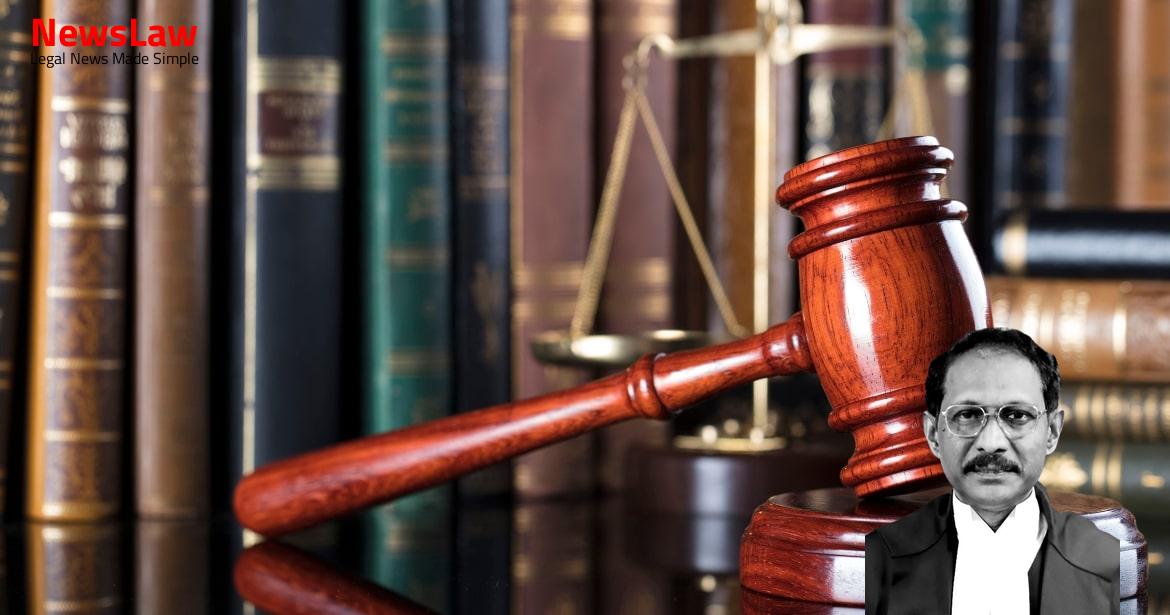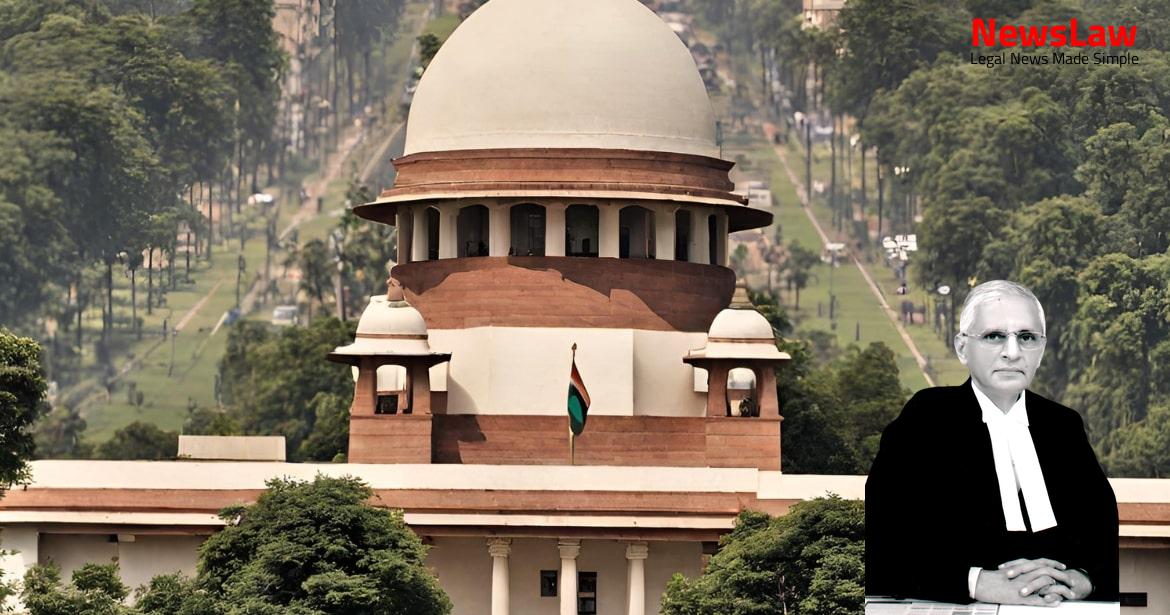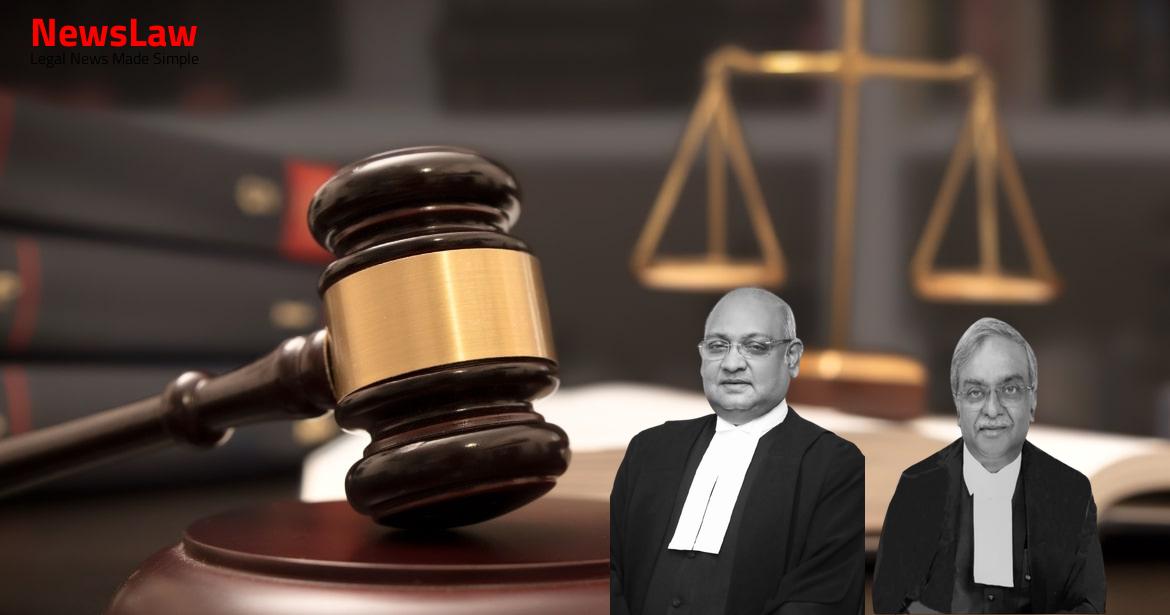The Trial Court vide judgment dated 17.05.2018 convicted the appellant for all the offences and awarded the following sentences as against each of the offences: Offence under section Sentence Fine 363 IPC 5 years RI Rs.1,000/- 376(2)(i) IPC Life imprisonment Rs.5,000/- 5(m)/6 of POCSO Act Life imprisonment Rs.5,000/- 302 IPC Death sentence Rs.5,000/- 201 IPC 5 years RI Rs.5,000/- 3.
Also Read: https://newslaw.in/case-type/civil/remand-of-writ-petition-for-restoration-and-decision-on-merits/
This Court, vide order dated 28.09.2022 required the Trial Court to submit its report after due inquiry as to whether the appellant was a juvenile on the date when the offence in question was committed. List this matter for further consideration along with the Report in the week commencing 31st October 2022.” Pursuant to the said order, a report has been received from the Court of First Additional Sessions Judge, Manawar, District Dhar, Madhya Pradesh dated 27.10.2022 running into 20 pages along with all the material evidence both documentary and oral adduced before it on the basis of which the report has been submitted. It is also proved taking into account 25.07.2002 as his date of birth, the applicant was 15 years 04 months 20 days of age as on 15.12.2017, and being below 16 years of age, he was Child as per section 2(12) of J.J. Learned counsel for the State of Madhya Pradesh has strenuously urged that the appellant be subjected to an ossification test to determine the correct age, as according to her, the documents filed during the inquiry before the Trial Court are not covered under Section 94 of the 2015 Act, and therefore, the only option left was that an ossification test be conducted by a medical board. The report is based upon documentary evidence as also oral evidence of the present head-mistress (IW-01), the retired headmaster (IW-08), five teachers of the primary institution (IW-02, IW-04, IW-07, IW-09 and IW-10) and also the guardian of the appellant (IW-06).
This Court, therefore, has no reason to doubt the correctness of the conclusion arrived at by the Trial Court regarding the date of birth of the appellant. (3) The age recorded by the Committee or the Board to be the age of person so brought before it shall, for the purpose of this Act, be deemed to be the true age of that person.” The State had full opportunity to raise such a plea before the Trial Court in the inquiry and then it was for the Trial Court to take a call as to whether any ossification test was necessary or not; 11 b) Secondly, ossification test will only give a broad assessment of the age.
Although it has been submitted that no birth certificate of the school was submitted, learned counsel for the appellant has pointed out from the documents attached to the report that in addition to the mark sheets and the school leaving certificate, the birth certificate was also filed which is Annexure I-3 to the report. The next question is as to what relief the appellant can be granted in view of the fact that he has been held to be a child and that too below 16 years of age under the 2015 Act. (3) If the court finds that a person has committed an offence and was a child on the date of commission of such offence, it shall forward the child to the Board for passing appropriate orders and the sentence, if any, passed by the court shall be deemed to have no effect. 14 (4) In case a person under this section is required to be kept in protective custody, while the person’s claim of being a child is being inquired into, such person may be placed, in the intervening period in a place of safety.” A perusal of the aforesaid section firstly gives a right to a person alleged to have committed an offence to claim that he is a child on the date of commission of offence and if such a claim is raised, the Court concerned shall make an inquiry, take such evidence as may be necessary other than the affidavit to determine the age of such person. Further, sub-section (3) provides that if it is found in the inquiry that such person was a child on the date of commission of such offence then the Court is required to forward the child to the Juvenile Justice Board for passing appropriate orders and further if any sentence has been imposed by the Court, the same shall be deemed to have no effect.
Orders regarding child found to be in conflict with law.— (1) Where a Board is satisfied on inquiry that a child irrespective of age has committed a petty offence, or a serious offence, or a child below the age of sixteen years has committed a heinous offence, then, notwithstanding anything contrary contained in any other law for the time being in force, and based on the nature of offence, specific need for supervision or intervention, circumstances as brought out in the social investigation report and past conduct of the child, the Board may, if it so thinks fit,— (a) allow the child to go home after advice or admonition by following appropriate inquiry and counselling to such child and to his parents or the guardian; (b) direct the child to participate in group counselling and similar activities; (c) order the child to perform community service under the supervision of an organisation or institution, or a specified person, persons or group of persons identified by the Board; (d) order the child or parents or the guardian of the child to pay fine: 17 Provided that, in case the child is working, it may be ensured that the provisions of any labour law for the time being in force are not violated; (e) direct the child to be (3) Where the Board after preliminary assessment under section 15 pass an order that there is a need for trial of the said child as an adult, then the Board may order transfer of the trial of the case to the Children’s Court having jurisdiction to try such offences.” On a perusal of the aforesaid Section 18 of the 2015 Act, it is to be noticed that the JJB having found a child to be in conflict with law who may have committed a petty or serious offence and where heinous offence is committed, the child should be below 16 years, can pass various orders under clauses (a) to (g) of sub-section (1) and also sub-section (2).
In the present case, the appellant is held to be less than 16 years, and therefore, the maximum punishment that could be awarded is upto 3 years. Some have set aside the conviction, sentence and have terminated the proceedings, others have upheld the conviction but on the basis of sentence already undergone being more than the maximum permissible under the Juvenile Justice (Care and Protection of Children) Act, 21 2000 have directed for release of the accused and third, where after maintaining the conviction, this Court has referred the matter to the JJB for passing appropriate orders on sentence.
Also Read: https://newslaw.in/case-type/criminal/presumption-of-genuine-endorsements-in-cheque-case/
Lokur, the first author of the judgment dealt with the issue as to whether the conviction could be sustained by this Court or it was only the sentence which was to be dealt with in accordance with the 2000 Act.
Further in paragraph 29, reference is made to section 20 of the 2000 Act and it was finally concluded in paragraph 23 30 that the matter needs to be examined on merits and if the juvenile is found guilty of the offence, he could not be allowed to go unpunished but considering the provisions of the 2000 Act, the question of sentence must be left to the JJB.
In the fourth set of cases, this Court has examined the case on merits and after having found the juvenile guilty of the offence, remitted the matter to the 24 jurisdictional Juvenile Justice Board on the award of sentence. Explanation.-In all pending cases including trial, revision, appeal or any other criminal proceedings in respect of a juvenile in conflict with law, in any court, the determination of juvenility of such a juvenile shall be in terms of clause (l) of 25 Section 2, even if the juvenile ceases to be so on or before the date of commencement of this Act and the provisions of this Act shall apply as if the said provisions had been in force, for all purposes and at all material times when the alleged offence was committed.” However, as the law stands, the punishment to be awarded to him or her must be left to the Juvenile Justice Board constituted under the Juvenile Justice (Care and Protection of Children) Act, 2000. There is no provision suggesting, leave alone making it obligatory for the court before whom the claim for juvenility is made, to set aside the conviction of the juvenile on the ground that on the date of commission of the offence he was a juvenile, and hence not triable by an ordinary criminal court. That perhaps is the reason why this Court has in several 27 decisions simply set aside the sentence awarded to the juvenile without interfering with the conviction recorded by the court concerned and thereby complied with the mandate of Section 7-A(2) of the Act.” Similar view was taken by a two-Judge Bench of this Court in the case of Mahesh vs State of Rajasthan and others, wherein this Court confirmed the conviction. The 28 first is with regard to the validity/correctness of the conviction recorded by the learned trial Court and affirmed by the High Court and, secondly, if the conviction to be maintained what should be the appropriate measure of punishment/sentence and whether the same should be imposed by this Court or the matter be remanded to the Juvenile Justice Board in accordance with the provisions of Section 20 of the Act of 2000.
The sum and substance of the above discussion is that in one set of cases this Court has found the juvenile guilty of the crime alleged to have been committed by him but he has gone virtually unpunished since this Court quashed the sentence awarded to him. We, therefore, adopt one of the possible approaches that has been earlier adopted by this Court in the four categories of cases mentioned above to examine the correctness of the conviction of the 30 accused appellants under the provisions of the IPC, as noticed above.
The conviction of the accused appellants under Sections 323, 324, 325, 427, 455 read with Section 149 IPC accordingly shall stand affirmed.” In the case of Satya Deo alias Bhoorey vs State of Uttar Pradesh, following the ratio and legal position laid down in Jitendra Singh (supra), this Court upheld the conviction and after setting aside the sentence of life imprisonment awarded to the appellant, it was directed that the jail authorities would produce the appellant before the JJB within seven days, and thereafter, the JJB would pass appropriate orders regarding the detention and custody with respect to the appellant therein.
The judgment in this case mainly dealt with the issue as to whether the report of Registrar (Judicial) of this Court could be accepted over and above the finding of the High Court which was different. Paragraph No 14 of the said judgment which grants the relief is reproduced herein: 33 “In view of the foregoing discussion, we are of the considered opinion that since Appellant 2 was a juvenile on the date of commission of the offence and though till date he has already undergone considerable jail sentence partly as an undertrial and partly as a convict, yet the appeal filed by Appellant 2 has to be allowed as was done in the case of Raju (supra) without going into the merits of the case and passing any other consequential order in that regard.”
Also Read: https://newslaw.in/case-type/civil/medical-negligence-and-compensation-a-landmark-decision/
According to sub- section (3) of section 9 of the 2015 Act, the Court which finds that the person who committed the offence was a child on the date of commission of such offence would forward the child to the JJB for passing appropriate orders and sentence, if any, passed by the Court shall be deemed to have no effect. If the conviction was also to be made ineffective then either the jurisdiction of regular Sessions Court would have been completely excluded not only under section 9 of the 2015 Act but also under section 25 of the 2015 Act, provision would have been made that on a finding being recorded that the person being tried is a child, a pending trial should also be relegated to the JJB and also that such trial would be held to be null and void. – Notwithstanding anything contained in this Act, all proceedings in respect of a child alleged or found to be in conflict with law pending before any Board or court 36 on the date of commencement of this Act, shall be continued in that Board or court as if this Act had not been enacted.” Having considered the statutory provisions laid down in section 9 of the 2015 Act and also section 7A of the 2000 Act which is identical to section 9 of the 2015 Act, we are of the view that merits of the conviction could be tested and the conviction which was recorded cannot be vitiated in law merely because the inquiry was not conducted by JJB. The object under the 2015 Act dealing with the rights and liberties of the juvenile is only 37 to ensure that if he or she could be brought into the main stream by awarding lesser sentence and also directing for other facilities for welfare of the juvenile in conflict with law during his stay in any of the institutions defined under the 2015 Act.
The impugned judgement shall stand modified to the aforesaid extent.
Case Title: KARAN @ FATIYA Vs. THE STATE OF MADHYA PRADESH (2023 INSC 197)
Case Number: Crl.A. No.-000572-000573 / 2019



